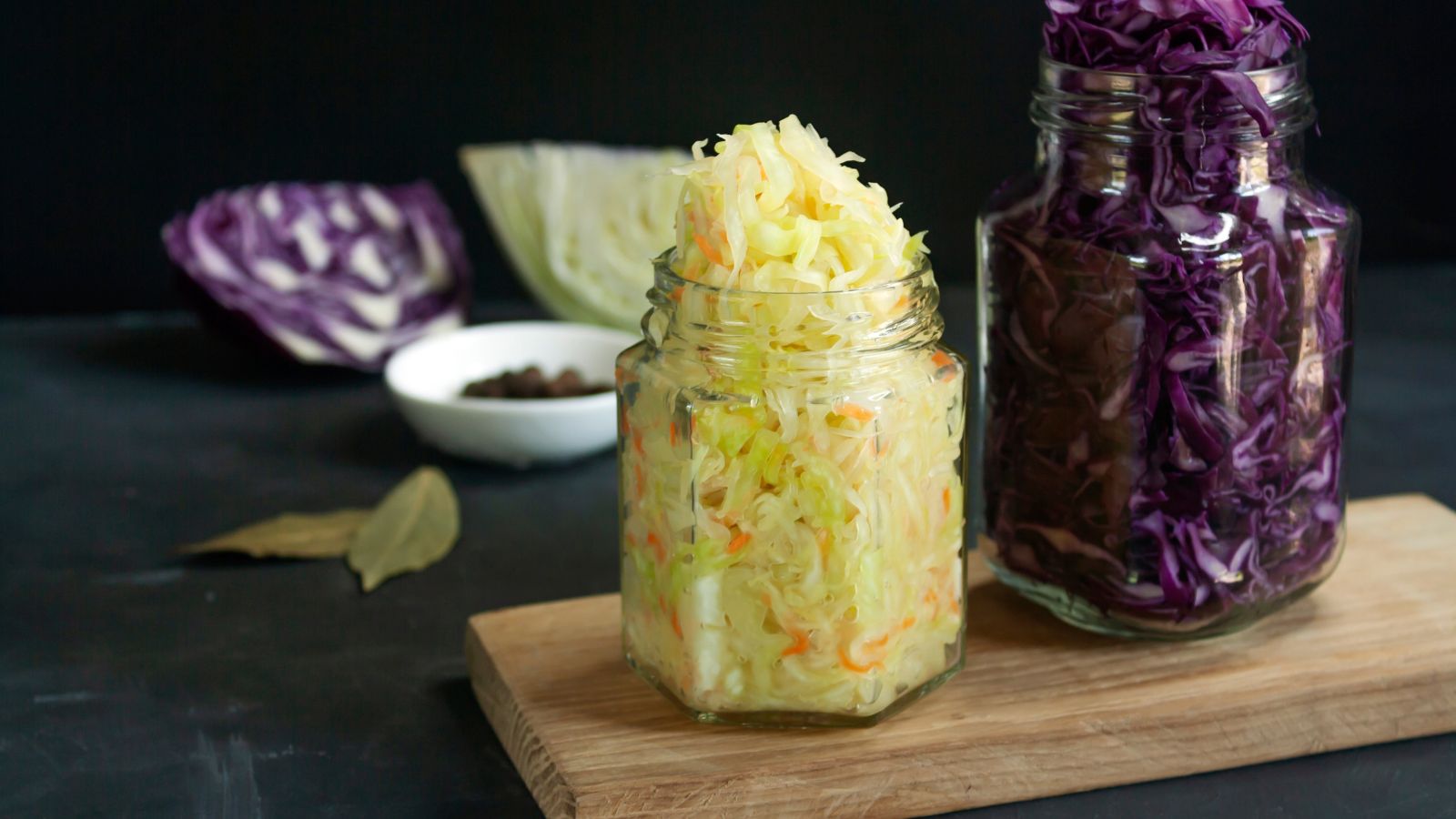
How Long Does Sauerkraut Last in Refrigerator? Facts You Need
Photo Credit: Canva Pro
Sauerkraut is a fermented food that is known to last a long time. However,how long does sauerkraut last in refrigerator? The answer changes based on how it's made and kept.
This guide tells you how to keep it fresh, how to tell when it's gone bad, and what to look out for. Here are the safest ways to store sauerkraut, whether it's raw or heated.
How long does sauerkraut last in refrigerator?
Photo Credit: Canva Pro
Sauerkraut is a preserved dish that can last a long time due to the fermentation process. But how long does sauerkraut last in refrigerator? It relies on whether it's raw, heated, or made at home. This part talks about how long sauerkraut can be kept in the fridge and how to do it right so it stays safe to eat and tastes great.
The difference between raw and pasteurized sauerkraut
There are two main kinds of sauerkraut: raw and cooked. However, it has live cultures in it, raw sauerkraut needs to be kept in the fridge to slow down the fermentation process. On the other hand, it has been heat treated to kill bacteria good and bad in pasteurized sauerkraut.
-
Raw sauerkraut shelf life: Keeps fresh for 4 to 6 months in a sealed container kept in the fridge all the time.
-
Pasteurized sauerkraut shelf life: Typically lasts 1 to 2 months after opening if kept sealed and consistently refrigerated.
-
Homemade sauerkraut shelf life: Similar to raw, lasting 4 to 6 months if properly fermented (typically 2–4 weeks) with 2–2.5% salt concentration and stored refrigerated in airtight containers..
-
Canned sauerkraut or jarred sauerkraut: Unopened jars are shelf-stable for up to 1–2 years depending on the manufacturer’s best-by date.
Best practices to extend its shelf life
The best way to keep sauerkraut's freshness for longer is to store it properly. Always keep sauerkraut in a cool place and be careful when handling it.
-
Use clean utensils: When scooping kraut, always use clean tools to keep harmful bacteria from getting into the food.
-
Keep it sealed: Store in a tightly sealed glass or plastic container with a tight lid, not one that is just covered.
-
Watch the brine: Use a small plate or weight to keep the cabbage submerged in the brine. Bad bacteria might be able to grow in a weak brine.
-
Avoid air: Being around room temperature Air affects food safety and shortens its shelf life.
-
Check for expiration date: If you buy it, write down the date on the jar.
Can sauerkraut go bad in the refrigerator?
Photo Credit: Canva Pro
Sauerkraut can go bad over time, even if you keep it in the fridge. The fermentation process makes it last longer, but how it is stored is also important. The taste, texture, and safety of sauerkraut depend on how it's handled after it's been opened. This part talks about how sauerkraut goes bad and what makes it go bad faster.
Understanding fermentation phases and spoilage
Sauterkraut ages over time, just like other fermented foods. It doesn't go bad right away, but it still has a shelf life after being opened.
-
Spoilage signs: The kraut turns gray, gets mushy, or smells bad.
-
Sour but safe: If it still smells sour and tastes fine, it's likely safe to eat.
-
Aging vs. spoilage: It's getting older, but not necessarily spoiled, if it tastes stronger and turns darker.
Temperature and storage effects on longevity
How long does sauerkraut last in refrigerator also depends on how cold it is and how much it is exposed to air.
-
Constant refrigeration: When you open sauerkraut, you should always put it in the fridge to slow down the fermentation process.
-
Avoid humid environments: When it's very humid, the brine and cabbage can change how they feel.
-
Use an airtight container: Keeps harmful bacteria out and helps lactic acid last longer.
-
Store away from heat: “Store away from heat sources (above 20°C/68°F) to avoid acceleration of fermentation and bacterial spoilage.
How do you know if sauerkraut has gone bad?
Photo Credit: Canva Pro
Even though fermented cabbage is made to last, it can still go bad. There are times when you should throw away sauerkraut, whether it's in a jar or something you made yourself. This part talks about the signs that sauerkraut is no longer safe to eat, both visually and physically.
Common spoilage signs to look out for
If sauerkraut looks or smells strange, that's your first clue. Some foods have a strong odor, but there is a difference between sour and spoiled.
-
Mold: If you see black, pink, or fuzzy growth, you know it's not safe.
-
Bad odor: If something smells like rotten eggs or something else strongly unpleasant, it's bad.
-
Texture changes: It's no longer good if it gets slimy or too soft.
-
Color shift: If something has turned brown or gray, it might not be safe to eat.
What’s safe but might look weird
It's not always spoiled when something changes. The fermentation process can lead to changes that aren't harmful.
-
White film: Yeast is usually safe, especially when making your own kraut.
-
Cloudy brine: Common in raw fermented dishes and not a sign that they are going bad.
-
Crunch and tang: It's likely still good if the cabbage stays crisp and sour.
-
Call customer service team: If you're not sure about a store-bought item, you can always ask.
Can you eat sauerkraut after 7 days?
Photo Credit: Canva Pro
Sauerkraut was originally created as a way to preserve cabbage and its nutrients for long periods. It turns into one of the most stable fermented foods when it ferments naturally.
However, how long does sauerkraut last in refrigerator after it's been opened? A lot of people aren't sure if kraut is still safe to eat after only a week. The answer depends on how the sauerkraut was stored, how much salt it has, and whether it was raw or pasteurized.
How long to ferment before refrigerating
The fermentation step is very important if you want to make your own sauerkraut or other fermented vegetables like kimchi. The cabbage gets more flavor and probiotics the longer it ferments. You can put kraut in the fridge after 5–10 days, but it's important to know this timeline for full health benefits and safety.
-
Safe to refrigerate: Having been active for about 5 to 7 days.
-
Best flavor: Depending on the temperature and salt, it grows in two to four weeks.
-
Homemade kraut: Should be kept in the fridge to keep the freshness and good bacteria.
-
Opened sauerkraut: It needs to go into the fridge right away to stop fermenting too much.
Is it still safe if it's not very sour yet?
To be microbiologically safe, sauerkraut should have a pH below 4.0, even if it's not strongly sour in flavor. You can still eat something that has been fermenting for up to a week, as long as it tastes fresh and has been kept in the fridge.
-
Not too sour: As long as it's early in the fermentation process, it's not a threat to food safety.
-
Smells fine: It's probably safe if it smells like pickles instead of rotten food.
-
Stored properly: In order to keep food fresh, it should always be kept in a jar that can't be opened.
What does FullyHealthy.com recommend for storing fermented foods?
Find gut-friendly and allergen-free products with confidence at FullyHealthy.com. Numerous of their foods, like fermented vegetables, are made to help the digestive system. Maintaining the right temperature and humidity is a key part of keeping food safe and preserving its flavor and probiotics.
Fermented foods for specialty diets
Naturally fermented foods like sauerkraut that has been heated up are sold by FullyHealthy.com. These need to be handled carefully so that their health benefits don't evaporate.
-
Raw kraut: With good bacteria and live probiotics.
-
Pasteurised sauerkraut: Heated, which makes it have longer shelf life but fewer probiotics.
-
Canned sauerkraut: Usually shelf-stable in unopened jar; just put them in the fridge after opening.
Storage tips based on product types
These suggestions will help sauerkraut and other similar foods keep their taste and quality.
-
Avoid kitchen counter: Keep in the fridge after opening the jar.
-
Sealed jar: Keeping food fresh requires using containers that don't let air in.
-
Don’t leave out: Opened sauerkraut left at room temperature goes bad very quickly.
-
Store away from heat: Avoid direct sunlight and hot appliances for best results.
Final Thoughts
How long does sauerkraut last in refrigerator? When stored properly, sauerkraut is one of the most reliable fermented foods. Refrigerating sauerkraut properly is important whether you make it yourself, buy it in a can, or buy it in a jar.
Making sure it's submerged in brine and checking for signs of spoilage is always a good idea. When handled properly, sauerkraut can stay fresh for months and has real health benefits, such as probiotics and better digestion.
Sauerkraut, kimchi, and other fermented vegetables are full of life. Fermentation creates good bacteria that are good for your gut and can make many foods taste better. Remember basic food safety: throw it away if it smells or looks bad. Sauerkraut should be kept in a clean jar with enough salt. It should always be kept in the fridge. It is that easy.
FAQs
How long does sauerkraut last in refrigerator after opening?
How long does sauerkraut last in refrigerator? Opened kraut can last about 1 to 6 months in the fridge if submerged, sealed, and kept cold. Check the best by date on the jar for guidance.
Is kraut still safe to eat if it's soft?
Yes, kraut can still be safe to eat even if it's soft, but check for off smells or mold. Fermented foods like kraut change texture over time, but if it's fresh and stored in the fridge, it's usually fine.
Can canned sauerkraut spoil before the best by date?
Canned sauerkraut is stable until the best by date if unopened. After opening, store in the refrigerator and keep it submerged in brine for food safety.
Does kimchi last longer than kraut?
Both kimchi and kraut are fermented vegetables, and their shelf life depends on storage. With proper salt and refrigeration, both can last months. Check smell, flavor, and appearance—such as color, texture, and brine clarity—to assess freshness.
Can I eat sauerkraut not stored in a refrigerator?
No. Without a refrigerator, the bacteria may spoil, especially if not submerged in salt brine. Long does sauerkraut sit out safely? Maybe a few hours—any longer affects food safety. Always store fermented foods in the fridge.

Leave a comment